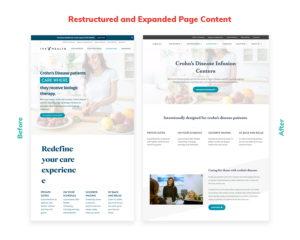As indicated by Google Developers, the leading search engine “is always working to better connect people to helpful information,” and if your content doesn’t provide real value for searchers, it can translate into a ranking penalty.
These adjustments first began in 2015, and they’ve gradually expanded over the years. Now, in Google’s latest “Helpful Content” update, the algorithm targets:
- Cloaked images, links, and redirects
- AMP content mismatch
- Keywords stuffing
- Thin content
- Duplicated content
What is the Helpful Content Update
The latest helpful content update is slightly different from the previous algorithm changes. Earlier updates focused more on obviously useless, dangerous, and spam content. However, this year’s helpful content update places a far more strict requirement on content quality and authenticity. Its primary goal is to make digital content more relevant and helpful to humans.
The update began to roll out on August 25, 2022, and finished updating on September 9, 2022. This is a sitewide update, which means if you have even a few poor-quality unhelpful pages, your entire site’s rankings may be impacted.
How Does It Affect the Healthcare Industry
Increasingly, the first place healthcare consumers go for information is a search engine.
That means healthcare service providers need a robust full-funnel content strategy to answer consumers’ questions at the top (TOF) and middle of the funnel (MOF).

Search “how to prevent sinus infections” and see how many search results appear and how similar most of them are. With the new update, businesses with low-quality content would soon see their past efforts go to waste, if not resulting in a rank position penalty. From now on, any healthcare facility must invest in creating original, relevant, and high-quality content if they want organic search visibility in front of TOF and MOF audiences.
Types of Content Google is Targeting
Google’s latest helpful content update targets the following types of content.
- Misleading (clickbait) content
- Unsatisfactory content
- Low-authority, low-expertise content
Clickbait Content
Clickbait content, also known as misleading content, fails to provide its promised answers. This frequently happens in the entertainment and lifestyle industries, where an article may provide information on the release date of a new season or show when the official production team hasn’t given an update.
In the healthcare industry, clickbait happens when you stuff research keywords into a conversion page that doesn’t provide the answer the audience needs.
Unsatisfactory Content
Too short, poorly written, unorganized, or superficial content is unsatisfactory for the consumers. The same goes with content paraphrasing existing articles all the way through.
Out-of-niche Content
Many organizations may branch outside their niche for more search visibility, not realizing they cannot compete against the experts in those areas. As a result, these “off-topic” articles have low credibility and authority.
Meanwhile, writing about irrelevant topics doesn’t benefit the organizations either. For example, when an addiction center writes about muscle building, they are more likely to get traffic interested in personal training and body-building than potential customers.
It’s best if they stick to the content topics where they’re experts instead of trying to address topics outside their wheelhouse.
Who is Impacted
Google’s helpful content update has the heaviest impact on industries relying heavily on content to capture TOF and BOF leads. For example,
- Lifestyle publications and media news
- Lyric websites
- Addiction treatment centers
- Medical product reviews and other review websites
Google & Cardinal’s Recommendations to Healthcare Groups
Essentially, Google’s helpful content update aims to promote businesses that bring value to their audience. Therefore, healthcare groups could significantly benefit from this update if they follow Google’s recommendations. What does this mean exactly? Well, I asked our SEO team to share their interpretation and best practices:
After reading your content, will a patient leave feeling they’ve learned enough about a topic to help achieve their goal?
Directly and clearly answer the core questions that patients are asking.
Will someone reading your content leave feeling like they’ve had a satisfying experience?
Create a comfortable UI and prioritize the mobile experience. Make your content easy to scan so readers can find the answers quickly.
Would your intended audience find the content useful?
Create thorough and extensive content that answers as many relevant questions in one piece as possible.
Does your site have a primary purpose or focus?
Determine your content strategy and only provide relevant content. It’s better to be the expert in your niche than another background noise in five different areas.
Are you keeping in mind our (Google’s) guidance for core updates and product reviews?
Focus on evergreen content that follows the fundamentals of SEO. This strategy tends to be algo-proof and provides the best user experience.
Conclusion
Content quality is a historic issue faced by healthcare marketers because of the high level of accuracy that consumers demand. You must provide detailed, accurate, and helpful content that doesn’t simply repeat what has been said already. This can be challenging for some provider groups, as many doctors and specialists don’t prioritize content creation. However, the need for original, authoritative content will only continue to increase. To succeed organically, healthcare marketers must make the patient a priority, extract their team’s insights, and develop unique content that satisfies consumers’ questions. When they do this, both patients and Google will be happy.
